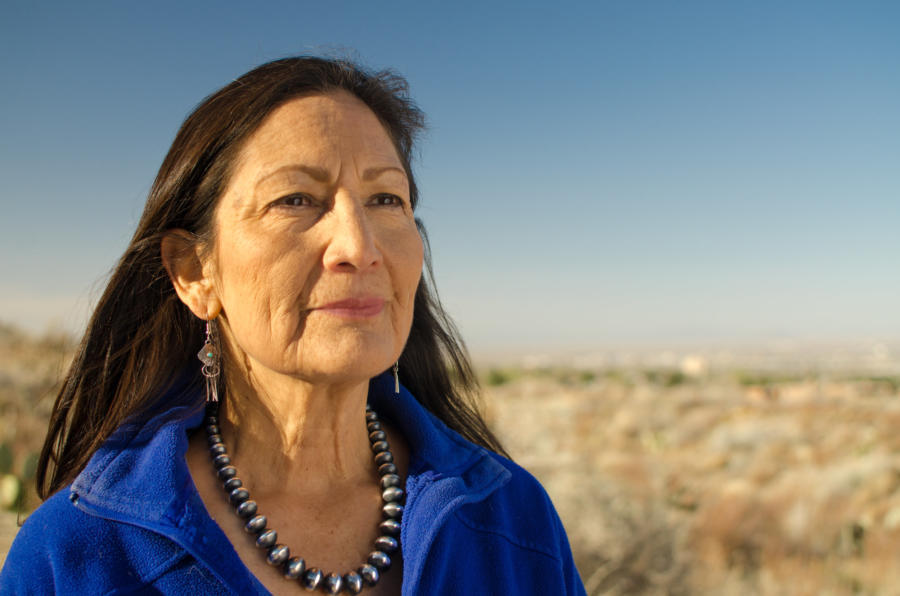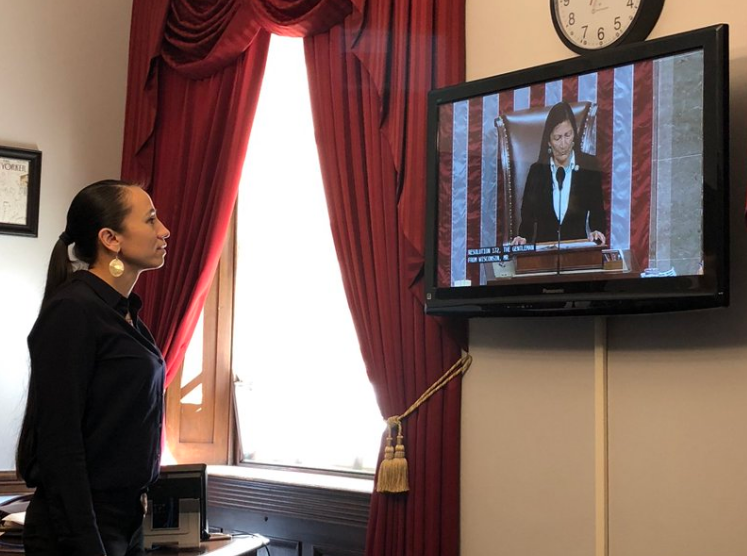
- Details
- By Native News Online Staff
WILMINGTON, Del. — Rep. Deb Haaland (D-N.M.), a tribal citizen of the Pueblo of Laguna, who currently represents New Mexico’s 1st congressional district in the U.S. Congress, has been nominated by President-elect Joe Biden to become the 54th secretary of the U.S. Department of the Interior. The announcement came Thursday from the Biden transition team and first reported by The Washington Post.
If confirmed by the U.S. Senate, Haaland will be the first American Indian ever to hold a Cabinet post in a presidential administration.
In November 2018, she and Rep. Sharice Davids (Ho-Chunk), who serves Kansas’s 3rd congressional district, became the first two American Indian women ever elected to Congress.
She was reelected to her second term in Congress on Nov. 3 with 58.3 percent of the vote.

Among federal departments, the Interior is the most engaged with Indian Country, as it is home to the Bureau of Indian Affairs, Bureau of Indian Education, Office of Special Trustee, and Bureau of Land Management.
Haaland was born into a military family in Winslow, Ariz. in 1960. Her mother, Mary Toya, is an American Indian woman and United States Navy veteran. Her father, J.D. Haaland, was a Norwegian American veteran of the United States Marine Corps and a recipient of the Silver Star for his courageous actions in Vietnam. He was buried with full military honors at Arlington National Cemetery in 2005.
Haaland earned her law degree in American Indian law from the University of New Mexico in 1994 when she was a single mother at the age of 34. She served as the tribal administrator for the San Felipe Pueblo from January 2013 to November 2015.
Her entry into politics began when she was a get-out-the-vote volunteer worker.
“I got into politics because I really wanted more Native Americans to get out and vote,” Haaland told uPolitics in an interview.
“I started going into campaign offices of candidates I liked and asking for lists of native Americans who I could make phone calls [to],” Haaland added. “That turned into me actually showing up in those communities, knocking on doors, registering voters. I’d go to the Navajo nation fairs, Pueblo feast days, set up a booth, register voters, and drive them to the polls when it was time.”
She worked on the Obama reelection campaign in 2012 in a paid staff position.
She then ran for Lieutenant Governor of New Mexico in 2014 on a ticket headed by the state’s Attorney General. Haaland’s ticket lost the general election, giving another term to Republican governor, Susana Martinez.
In 2015, she became the state chairperson of the New Mexico Democratic party.
“I became the state chair of our party in 2015 and we won across New Mexico. We had lost our statehouse in 2014 and we won it back in 2016 under my leadership,” said Haaland of her first formal position. “When I finished my term there I thought ‘maybe I could run for Congress.'”
Since becoming one of the first two American Indian women elected to Congress, Haaland has become one of the most high profile American Indians in and out of Indian Country.

In 2019, Haaland made history when she became the first American Indian woman to preside over the House chamber, appropriately enough, during debate over voting rights and campaign reform.
“Presiding over the house, sitting in the speaker’s chair, it was especially significant because at the time we were working on the amendments to pass HR1 which was the big bill to protect voting rights and get big money out of politics,” said Haaland about the experience. She continued by describing how it “was pretty amazing” that she was “standing in that chair as the first Native woman.”
More Stories Like This
Native News Weekly (August 25, 2024): D.C. BriefsUS Presidents in Their Own Words Concerning American Indians
Next on Native Bidaské: Covering Indian Country: Lessons from 2025 & the Road Ahead
The Stories That Started to Define Cultivating Culture in 2025
The National Congress of American Indians (NCAI) Mourns the Passing of Former U.S. Senator Ben Nighthorse Campbell (Northern Cheyenne)
Help us defend tribal sovereignty.
At Native News Online, our mission is rooted in telling the stories that strengthen sovereignty and uplift Indigenous voices — not just at year’s end, but every single day.
Because of your generosity last year, we were able to keep our reporters on the ground in tribal communities, at national gatherings and in the halls of Congress — covering the issues that matter most to Indian Country: sovereignty, culture, education, health and economic opportunity.
That support sustained us through a tough year in 2025. Now, as we look to the year ahead, we need your help right now to ensure warrior journalism remains strong — reporting that defends tribal sovereignty, amplifies Native truth, and holds power accountable.
 The stakes couldn't be higher. Your support keeps Native voices heard, Native stories told and Native sovereignty defended.
The stakes couldn't be higher. Your support keeps Native voices heard, Native stories told and Native sovereignty defended.
Stand with Warrior Journalism today.
Levi Rickert (Potawatomi), Editor & Publisher

